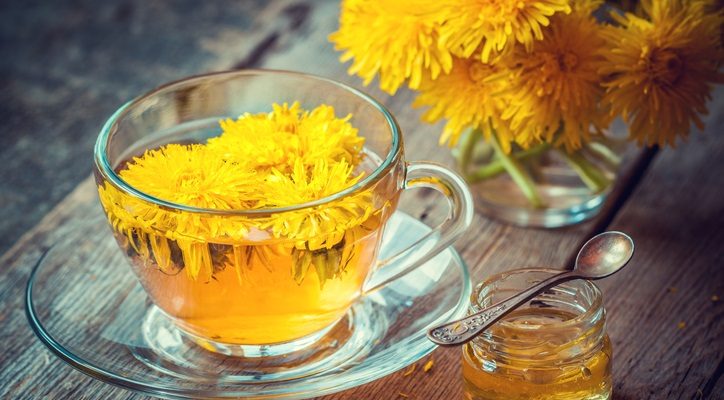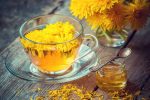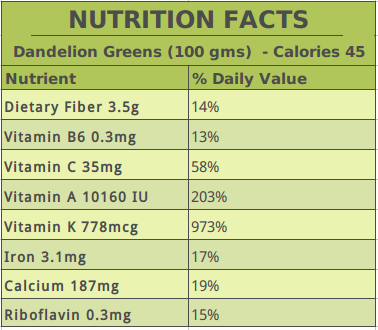
When the words “dandelion tea” come up, there’s a good chance that many of you may just tune out. After all, it kind of sounds like a hippy concoction made by your aunt who may still be trapped in the ’60s. But with so much talk about the nutritional benefits of dandelion tea, others may be wondering if the yellow weed that grows during spring is actually healthy.
The truth of it is, dandelion tea has a number of health benefits that are worth checking out. Dandelions are full of vitamins and minerals that are great for you as well.
Dandelion Nutrition Facts
According to SELF Nutrition Data, dandelion leaves and roots are an excellent source of vitamins and minerals, especially vitamins A and K. They are also low in calories, carbohydrates, and fat. It’s astonishing that this plant that we consider a weed actually contains so many nutrients that are good for us.
Granted, some of this nutrition value may be lost when the leaves and roots are dried and turned into tea form, but on a whole, that’s a whole lot of goodness you are putting into your cup. But how do these vitamins, nutrients, and minerals benefit you? We’re glad you asked.
10 Ways Dandelion Tea Benefits You and Your Health
Now that you know more about the nutritional value within dandelion greens, it’s time to learn the benefits of dandelion tea.
The benefits of dandelion tea require more research-based evidence, as most tests have been performed on animals and not humans. However, most benefits are based on the properties and nutritional facts of dandelion and human experiences, as this weed has been consumed by humans for ages.
1. Vitamin K is abundant in dandelion, and it’s very important in the realms of cardiovascular and bone health. Vitamin K is one of the main vitamins used in blood clotting and bone mineralization.
Maintaining high levels of vitamin K in the system could also be useful during menstrual bleeding. Preliminary research studies suggest that vitamin K may also help in cancer prevention, particularly for colon, stomach, nasal, prostate, and oral cancers. However, more scientific evidence is needed to support these claims.
2. Vitamin A, also found in great amounts in dandelions, is great as a helper vitamin for things like preventing premature aging, loss of vision, and respiratory infections.
3. Dandelions and dandelion tea may be helpful in maintaining your liver health. Studies suggest the vitamins and minerals in dandelions are good at helping not only to cleanse the liver, but also with the secretion of bile.
4. Vitamin C found in dandelions could aid mineral absorption and reduce inflammation around the liver.
5. Dandelions are rich in antioxidants; this aspect is currently under study for their potential skin care benefits and ability to reduce cellular damage.
6. Dandelion tea may also work as a prevention method for urinary tract infections in women and increase the quantity of breast milk in new mothers.
7. Dandelions help stimulate appetite and are used to cure upset stomach.
8. Dandelions may help normalize blood sugar and cholesterol levels.
9. Dandelions help boost the immune system because of their antioxidant properties.
10. Dandelion roots help improve the digestive system and are a mild laxative.
With a plant like dandelion, the future possibilities may be limitless. But for the here and now, they can do a pretty good job of helping out your body’s circulatory system. Now the big question is how do you pick the dandelions for dandelion tea?
Dandelion Selection
Picking dandelions for your dandelion tea is pretty straight-forward. Avoid fields and plants where pesticides may have been used as they may give your tea an unplanned and unwanted kick. Focus on young plants with yellow flowers as the older the dandelion gets, the more bitter the plant becomes to taste.
If you want to use the roots as well as the leaves, dig up the entire plant; don’t just pull on the top. If you want to keep them fresher longer, wrap the roots in a damp paper towel before placing the plant in the fridge.
Now that you’ve selected your plants, it’s time to make the tea.
How to Make Dandelion Tea
The first step is to rinse off the dandelion plant. This is not only to remove any dirt or bugs you might have brought with it, but also to help remove any pesticides that you may be unaware of. After that, there are different ways to make dandelion tea.
1. Dandelion Root Tea (fresh root)
Separate the root from the rest of the plant. Boil a quart of water. Chop the dandelion root roughly, and add two teaspoons of the chopped root to the boiling water. Cover.
Lower the heat and allow the root to simmer for a minute. Remove the concoction from the heat and let it steep for about 40 minutes. Strain into a teapot and serve.
2. Dandelion Flower Tea
Collect a few handfuls of dandelion flowers from your previously washed plant. Pull the petals away from the base of the flower and place them in a bowl.
Drop a handful of flower petals for each cup of tea in the teapot. Pour boiling water over the top, and let the tea steep for about three minutes. Serve with honey to taste.
Important: Possible Side Effects
Is dandelion tea healthy? While eating dandelions and drinking dandelion tea is perfectly safe for the majority of us, there are a few possible dandelion tea side effects that you should be aware of. Like any other food or flowers from the same species, such as sunflower or daisies, you may be allergic to dandelions. So, take heed to any symptoms that might occur when handling dandelion plants or drinking dandelion tea.
Dandelions may also affect how your body absorbs some medications and antibiotics. According to research by the University of Maryland Medical Center, dandelions may cause heartburn and skin irritations in some people.
People with kidney or gall bladder issues should avoid having dandelions in any form, especially if they are under medication for the same. Dandelion leaves work as a diuretic; therefore, if you are on certain medications such as blood thinners, antacids, or diuretics, they may interact with dandelion and be thrown out of your body faster through urination.
If you are on diabetes medications to control your blood sugar, consuming dandelion may further lower your sugar levels, causing hypoglycemia. If you aren’t sure about whether dandelion may affect you, consult your physician.
Dandelion Tea: Worth a Try
Given the number of benefits that dandelion tea might be able to provide you, combined with how easy it is to make, you may want to consider not spraying your backyard this year and turning it into a small garden for your new tea stash instead.
And while the taste is not to everyone’s liking in tea form, you can also use dandelions as part of a salad and in other cooking dishes. And, they are also an important part of bees’ natural environment. With all of these benefits in one plant, it may be worth your time to investigate if it is suitable for you.
Sources:
“Dandelion Herb Nutrition Facts,” Nutrition and You.com, http://www.nutrition-and-you.com/dandelion-herb.html
“Dandelion,” The University of Maryland Medical Center; http://umm.edu/health/medical/altmed/herb/dandelion
“Dandelion greens, raw Nutrition Facts & Data,” SELF Nutrition Data; http://nutritiondata.self.com/facts/vegetables-and-vegetable-products/2441/2














